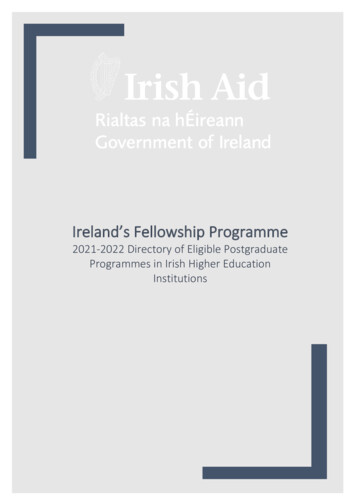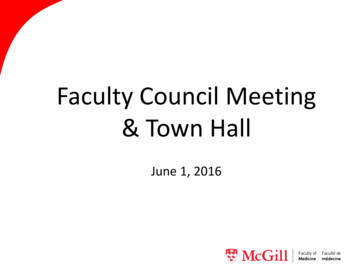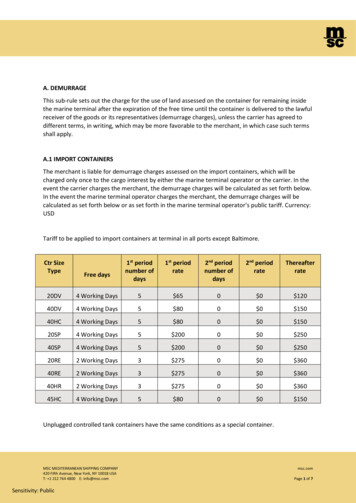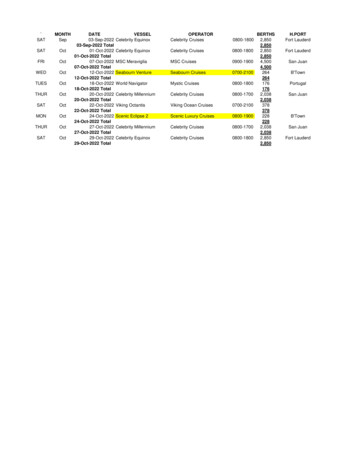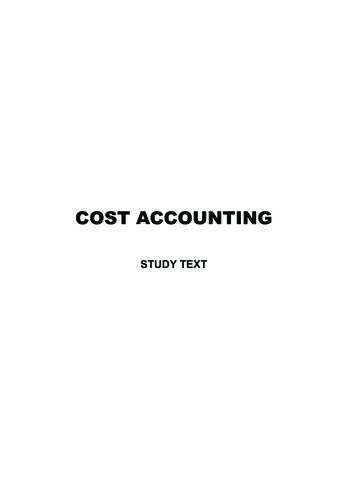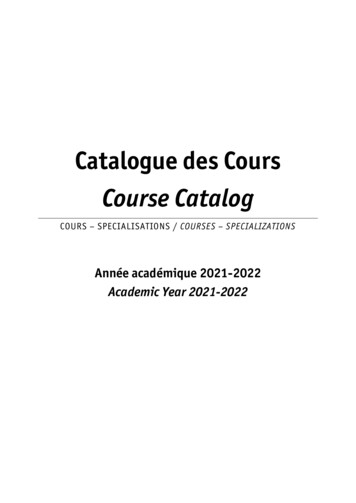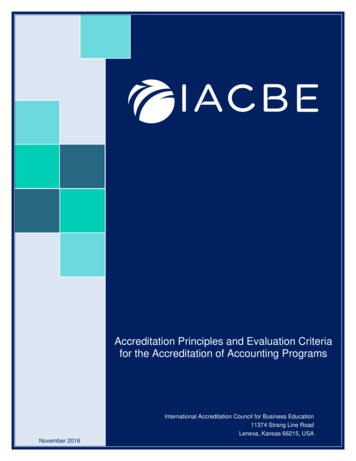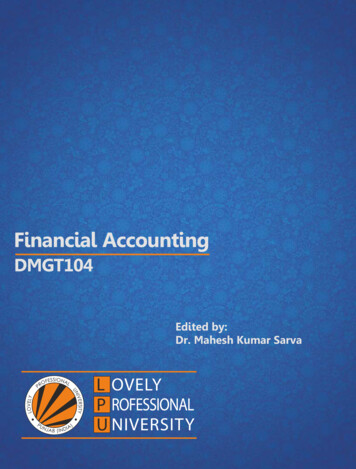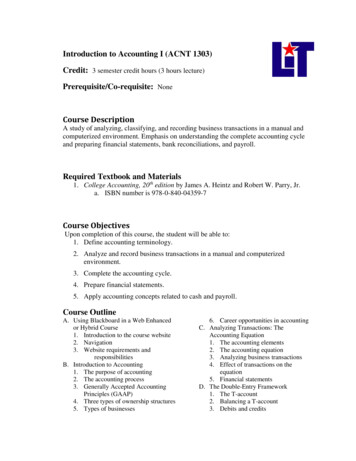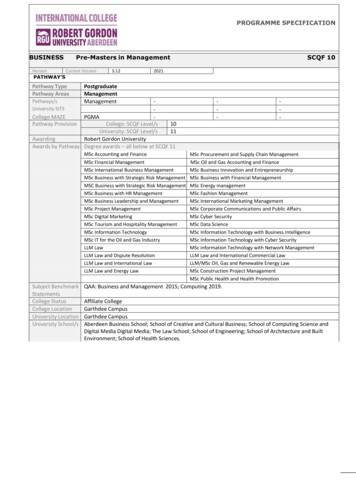
Transcription
PROGRAMME SPECIFICATIONBUSINESSPre-Masters in ManagementVersionCurrent VersionPATHWAY’SPathway TypePathway AreasPathways/sUniversity ge MAZEPGMAPathway ProvisionCollege: SCQF Level/s10University: SCQF Level/s11AwardingRobert Gordon UniversityAwards by Pathway Degree awards – all below at SCQF 11MSc Accounting and FinanceMSc Financial ManagementMSc International Business ManagementMSc Business with Strategic Risk ManagementMSC Business with Strategic Risk ManagementMSc Business with HR ManagementMSc Business Leadership and ManagementMSc Project ManagementMSc Digital MarketingMSc Tourism and Hospitality ManagementMSc Information TechnologyMSc IT for the Oil and Gas IndustryLLM LawLLM Law and Dispute ResolutionLLM Law and International LawLLM Law and Energy LawSubject BenchmarkStatementsCollege StatusCollege LocationUniversity LocationUniversity School/sSCQF 10--MSc Procurement and Supply Chain ManagementMSc Oil and Gas Accounting and FinanceMSc Business Innovation and EntrepreneurshipMSc Business with Financial ManagementMSc Energy managementMSc Fashion ManagementMSc International Marketing ManagementMSc Corporate Communications and Public AffairsMSc Cyber SecurityMSc Data ScienceMSc Information Technology with Business IntelligenceMSc Information Technology with Cyber SecurityMSc information Technology with Network ManagementLLM Law and International Commercial LawLLM/MSc Oil, Gas and Renewable Energy LawMSc Construction Project ManagementMSc Public Health and Health PromotionQAA: Business and Management 2015; Computing 2019.Affiliate CollegeGarthdee CampusGarthdee CampusAberdeen Business School; School of Creative and Cultural Business; School of Computing Science andDigital Media Digital Media; The Law School; School of Engineering; School of Architecture and BuiltEnvironment; School of Health Sciences.
RationaleThe partnership between the College and Robert Gordon University facilitates the acquisition of anPostgraduate degree by international students who, because of their previous educationalexperience, are not normally able to gain direct access to the University’s degree courses. The pathwayhas therefore been developed to satisfy important pedagogical issues:1. To ensure that international students have a dedicated period of time, in a familial and safe setting, toadjust to and acquire the skills to prepare for further studies within a western learning environment.2. To satisfy the University’s quality protocols, which in turn are directed by the QAA SubjectBenchmark requirements, for articulation purposes.3. Facilitate access to a pathway leading to a University degree award.4. Protect the entry tariff of the University to its degree courses and ensure that the University does notneed to lower its entry tariff in order to increase its international student population.5. Widen access and participation in higher education in line with the University’sInternationalisation agenda.6. Commit to the provision of best practice customer service and student experience forinternational students.7.Support the integrity of the University’s QAA commitment by adopting and adapting theUniversity’s quality regime to form the basis of a robust, quality driven academic provision andadministrative systems and processes.8. Facilitate effective and efficient, low risk public/private partnership in line with the University’sstrategic mission and vision.9.Enhance the global reach of the University into previously untapped markets and marketsegments.10.11.12.13.Educational AimsPROGRAMMETitleSCQFCredit PointsDuration of StudyWeeks of StudyAdd resource, human and financial, to the University’s marketing process.Facilitate access to a global recruitment process.Assist in the diversification of the student body.Make available the benefits derived from access to Navitas’ global reach and corporatemarketing arm.The programme, Pre-Masters in Management, has been devised in accordance with Navitas UKgeneral educational aims along with those formulated for the College, see CPR 5, and the nominatedoutcomes desired by Robert Gordon University, Aberdeen Business School, to impart a high quality ofeducation in the disciplines required.The educational aims of the programme are to:1. Prepare students, who would not normally be considered qualified, to an appropriate standardfor entry into the Aberdeen Business School at SCQF Level 11 of the prescribed postgraduatedegree schemes.2. To endow each individual with an educational pathway that augments opportunities forprofessional employment and development in the commercial sector at both a national andinternational level.3. Develop in students a fundamental knowledge that can demonstrate an understanding of theskills and appropriate techniques that can be applied to a variety of management problems, so asto support their transfer into SCQF Level 11 of the prescribed degree schemes.4. Develop in students an appreciation and desire to learn based on competent intellectual andpractical skills building to a set of transferable skills that will support them in all aspects of theironward academic studies/careers and assist informed decision making.5. Ensure that students have attained the prescribed level of inter-disciplinary languagecompetence described as Level B2 ‘Independent User’ by the Council of Europe, see CommonEuropean Framework of Reference for languages: Learning, teaching assessment 2001, Council ofEurope, CUP, Cambridge, p. 24, Table 1. Common Reference Levels: global scale.6. Ensure that graduates have attained the prescribed level of inter-disciplinary languagecompetence to a minimum pass mark of 65% in the ACL accredited module Interactive LearningSkills and Communication, and therein a minimum 6.5 IELTS equivalent.Pre-Masters in Management1060One (1) semesterTen (10) weeks
Mode of StudyMode of DeliveryNotional HoursContact HoursDirected Study HoursSelf-directed Study HoursDelivery ModelLanguage of DeliveryIntendedOutcomesLearningFull-timeFace to Face600180120300Standard Delivery Model (SDM)DeliveryEnglishAssessmentEnglishCouncil of EuropeCommon language reference level B2 Independent UserACL AccreditationInteractive Learning Skills and CommunicationGeneric:All modules have a set of Generic Learning Outcomes (LOs) attached to them, see relevant DefinitiveModule Documents (DMDs). These provide a basic set of core transferable skills that can beemployed as a basis to further study and life-long learning. They are delivered using an interdisciplinaryand progressive approach underpinned by the relevant Interactive Learning Skills and Communication(ILSC) module, to build these core skills within the context of subject-specific learning.Incorporated in these core skills are the key themes of relationship-management, time- management,professional communication, technological and numerical understanding and competency.The Generic LOs for the programme are tabled below:Key knowledge will be demonstrated by::Personal organisation and time-management skills toachieve research goals and maintain solid performanceKey skills will be demonstrated by the ability to:Meet converging assessment deadlines – based on punctualityand organisation with reference to class, group and individuallevels.sessions within a dynamic and flexible learning environmentwith variable contact hours and forms of delivery.Communicate clearly using appropriate nomenclature toenhance meaning in all oral and written assessments with norecourse to collusion or plagiarism.Present clearly, coherently and logically in a variety of oral andwritten formats using a variety of appropriate qualitative andquantitative tools and evidence bases.Demonstrate an understanding of the current themes of agiven topic, the academic and practical foundation on whichthey are based – demonstrated by a lack of plagiarism andneed for collusion in both individual and group work.Collate, summarise, reason and debate/argue effectively on agiven topic with appropriate reference to another’s work orideas/concepts.Meet and succeed in each of the varied assessments presented.Understanding of the importance of attaining in-depthknowledge of terminology as used in a given topic area, as abasis to further study.Understanding, knowledge and application of appropriateand effective methods of communication to meet formalassessment measures.Understanding and knowledge as to the development of theindustry and/or scholarship in relation to a given topicunder study.Understanding of the rules applying to plagiarism andcollusion.Ability to work as an individual, in a small team and in alarger group to effect data collation, discussion andpresentation of evidence.Specific:Module-based LOs are described as Specific LOs and combine to make up the Intended LOs of theprogramme/stage of study. Specific LOs for a module are fully expressed in the relevant DMD andModule Guide (MG). Specific LOs for the majority of modules are blended from the relevant and currentUniversity Module Outlines at SCQF Level 10 to ensure parity, see Appendix 4 in this document.Intended:Each programme/stage of study incorporates a set of Intended LOs to define the wider academicbased knowledge and skills acquisition. These key areas are described and tabled below:A1Knowledge and UnderstandingTo obtain a knowledge andunderstanding:Identify and discuss the concept ofbusiness and management alongwith its internal and externaloperating processes, inclusive ofplanning and strategy, growth,innovation,entrepreneurship,marketing, products/services, financeand accounting systems, informationsystems and human resource.Teaching/learning methods andstrategies:Acquisition of Intended LOs via acombination of small group lectures(listening, writing and reading); smallgroup-based tutorial labs/coursework(oral, reading, listening and andwrittenpresentation)andsummativeexamination (reading and writing). Inaddition, learning outcomes, A.6 and A.8Assessment methods andstrategies are tested via.A.1 to A.14 – via a combination ofsummative (closed-book) examinationsand summative coursework in the formof a mini-dissertation, research proposal,written assignments, in- course tests,project reports and presentations.Inparticular, A.7 and A.8 are tested via aresearch protocol/proposal and A.9 andA.10 are further assessed in the minidissertation.
234567891011121314Define and discuss the organisational will be developed through groupfunction in the external commercial debates.and global economic environment.Additional support is provided throughDefine and discuss the Global the provision of small peer- led tutorialgroup work and of individual tutorialeconomic environment.Defineandrecognisethe support; College module-specific subjectimportanceofinternational specialists delivering modules; ess.Identify and Explain classic and monitoring and appraisal by Collegecontemporary concepts and theories academic management.of economic thinking.Define and discuss principles, Students are encouraged to interactprocedures and practices of with teaching staff and academiceffective management and leadership services to ensure that they understandwithin organisations with the global assessment requirements and that theirwork is aligned with marking criteria.economic context.Identify and discuss emerging andEnsuring all candidates acquireadvanced economies.Apply the history and epistemology grounding in Robert Gordon Universityof scholarship and research to and associated end-user IT platforms foracademic study.postgraduate level studies.Formative assessment is a constantfeature of the programme and is deployedin the form of peer discussions, debatesandthecreation of a classroomenvironmentwhichchallengesconventional wisdom and encouragescritical engagement.All students are expected to maintainan 85% attendance record.Apply a full range of researchmethodologies and research methods The opportunity to interface regularlywith noted platforms in College, Robertfor postgraduate level study.GordonUniversitylibraryandindependent environments to developApply the ethics of research and thean understanding of the implications ofprocess of undertaking research.the use of different e- learning forRecognise techniques and formatsresearch.of research communication.Apply selected quantitative andqualitative data analysis methods.Identify a full range of academic andpersonal skills required to studysuccessfully at postgraduate level.Demonstrate techniques and forms ofeffective and clear communicationexpressed in a variety of elB2‘Independent User’ as described by theCouncil of Europe, see benchmarkingdocumentation of this document forreference.The Programme Specification, DMDs,Module Guide, reading lists, lecturersand notes, and assessment regimes areavailable via the College e- learningportal for queries to be met.Students are encouraged throughout thestage of study to undertake independentstudybothto supplement andconsolidate what is being taught/learntand to broaden their individualknowledge and understanding of thesubject.Feedback is given to all students on allwork produced and, where appropriate,confirmed in individual appraisal eventsassociated with modules and specificallyILSC. Additional interviews are madewith the tutor and/or the Collegeacademic services to evaluate anddiscuss any emerging learning issues andtherein candidates options.B123Cognitive/Intellectual SkillsTo obtain intellectual/cognitiveskills with the ability to:Apply the subject-specific theories,concepts and principles foundwithin the disciplines of business andmanagement with the economicenvironment.Demonstrate a critical approach toknowledge commensurate withpostgraduate level study.Teaching/learning methods andstrategiesAchievement of Intended LOs via acombination of lectures, seminarsand tutorials.Assessmentmethodsstrategies via.andB.1 to B.5 - via a combination ofsummative (closed-book) examinationand summative coursework in the form ofa mini-dissertation, research proposal,presentation, written assignments, andinformally via spot in- course tests. Inparticular, B.3 is further assessed in themini- dissertation.Additional support is provided in theform of guest presenters fromprofessional practice and research activeacademics. One-to-one tutorials andpeer review will be used to develop B.3Formative assessment is a constantFormulate and test subject-specific –B.5 in more depth.statements,hypothesesand Ensuring all candidates acquire feature of the programme and is deployedgrounding in Robert Gordon University in the form of peer discussions, debatesarguments.
4Present reasoned arguments toback up academic position(s).5Describe, analyse and interpret arange of data sets.CPractical SkillsTo obtain practical skills withthe ability to:12Source, read, assimilate, evaluate,utilise and reference any literaturerelevant to the topic.Competently plan and execute oraland written works appropriate tothe discipline and level under study.and associated end-user IT platforms foracademic study.The opportunity to interface regularlywith noted platforms in College, RobertGordonUniversitylibraryandindependent environments to developan understanding of the implications ofthe use of different e- learning forresearch.Additional support is provided throughthe provision of small peer- led tutorialgroup work and of individual tutorialsupport; College module-specific subjectspecialists delivering modules; guestspeakers(industry/topicspecific);monitoring and appraisal by Collegeacademic management.andthecreation of a classroomenvironmentwhichchallengesconventional wisdom and encouragescritical engagement.Teaching/learning methods andstrategiesAssessmentmethodsstrategies via.Communication skills are central to allteaching, class/lab-based learning andself-directed study; these are tested outthroughout all assessment practices.Students are encouraged to explore anddevelop variety of communication skills,andIntegrated themes used across thecontinuous assessment framework for theprogramme to test robust copabilityskills in a number of environments.C.1 to C.4 – via a combination of
3Collect, record, collate and analyse under pinned by the ILSC module.data using established techniqueswhere applicable, on an individual Achievement of Intended LOs via aand group basis.combination of lectures, seminars andtutorials.Peer review sessions will support thedevelopment and assessment ofresearch protocols (C.2 and C.3).Additional sessions are provided in theform of guest presenters fromprofessional practice, research activeacademics and library staff, togetherwith monitoring/appraisal by ICRGUacademic management team.summative (closed-book) examinationand summative coursework in the form ofa mini-dissertation, research proposal. Inparticular C.2 is tested in the researchproposal and mini- dissertation andC.3 in the minidissertation.Formative assessment is a constantfeature of the programme and is deployedin the form of peer discussions, debatesandthecreation of a classroomenvironmentwhichchallengesconventional wisdom and encouragescritical engagement.Practical sessions will build confidenceAll students are expected to maintainin the use of ICRGU and University ITan 85% attendance record.platforms to develop an understandingof the implications and possibilities ofdifferent computer and IT systems forresearch.
D1AssessmentRegulationsTransferable SkillsTo obtain transferable skillswith the ability to:Select, read, digest, summarise andsynthesise information material in avariety of forms, both qualitative andquantitative (text, numerical data anddiagrammatic) and in an appropriatemanner to identify and determine keyfacts/themes and relevancy.2Use and clearly communicatediscursive, numerical, statistical anddiagrammatic ideas, concepts, resultsand conclusions using appropriatetechnical and non- technical languageand language style, structure and form.3Applybasicresearchandreferencing techniques to allaspects of study, information collation,informationpresentationandformulation of academic opinion.4Embed the importance of self-studyand reliance.This involvescultivatinganddevelopingaresponsibility within each student totake cognizance for their own learning,initiative, effective time- managementand self-discipline ing/learning methods andstrategiesEmbedded in all aspects of deliveryand assessment structures is theneed to disseminate informationpresented in a variety of forms andmodalities.Using a combination of all delivery andassessment styles (oral and written,group and individual) used within theprogrammetodemonstratecompetence in presentation, reports,minidissertation(toenhancesummarisation techniques and limitcollusion and plagiarism), timedassignments (indicating knowledge,organisation, time management andclear communication ability), of thefollowing: design a persuasive messagefrom the audience’s perspective;demonstrate effective presentationdelivery skills in a variety of situations;leave effective voice-mail messages;write persuasiveE-mails, memosletters; and write factual essays andreports in plain English. These skills arereflective of in-context reading, writing,oral and speaking skills and enhancedlanguage acquisition.Assessmentmethodsstrategies via.andD.1 to D.4 – via a combination ofsummative (closed-book) examinationsand summative coursework in the form ofa mini-dissertation, research proposal. Inparticular D.3 is tested in the researchproposal and mini- dissertation and D.4 inthe mini- dissertation. The ability toeffectively manage a complex and flexibletimetable, combining a variety of deliveryand assessment modes, some of whichare conflicting in submission and style(oral/written and individual/small group,to demonstrate effective organisation,self-reliance and time-management skills.Formative assessment is a constantfeature of the programme and is deployedin the form of peer discussions, debatesand is situated within a classroomenvironmentwhichchallengesconventional wisdom and encouragescritical engagement.Summary:The programme is compliant with both the generic assessment regulations of Navitas UK and those ofthe College, see CPR QS9.Each module within the programme/stage of study has an associated Module Outline that may bebroadened into a Definitive Module Document (DMD) either of which will be provided to students atthe beginning of their studies. These documents offer generic information on the Aims and SpecificLOs of the subject/s under study, basic references and the attendance and notional contactrequirements. They also include topics/subject areas of study and outlines of the assessment events.Each module has an associated textbook, as prescribed by the University’s Module Outlines, and aspecifically developed Module Guide (MG) which includes the types of assessment activitiesemployed, teaching methods, resources, assessment criteria and expectations, contact details of thetutor/s, referencing (if applicable) and submission/completion requirements. Contained is also adetailed lecture-by-lecture schedule of subjects students can be expected to cover over the teachingperiod. This acts as a useful reference for study and revision purposes. All assessment is designed toreflect and measure both an individual’s and a cohort’s achievement against the Specific LOs of themodule and Intended LOs of the programme.In-course written, reading, listening and oral assessment is built in to all modules through generalinteraction between tutors and students, student peer review and small group tutorials or individualtutorials/appraisals. Modes of assessment include essay/report writing, oral presentation (group orindividual, and poster), portfolio, and e-based, in-class or take home exercises/tests.All written assessments must follow certain criteria in style and submission as noted in the relevantModule Guides and Student Guide. This form of assessment is considered fundamental to a student’sability to communicate ideas and evidence with clarity, relevance and logic in a planned andorganised manner. Plain writing style, syntax and grammar are core skills that can be enhanced tosupport the maturing of individual students’ composition and thus academic and transferableproficiency.Oral presentations, whether part of formal or informal assessment practice, are encouraged within allmodules as they promote, among others, transferable skills and can identify those students who may beplagiarising material. It is advised, however, that they should not make up more than 60% of the finalmodule mark unless as part of the learning rational.Oral group presentations should ideally contain no more than five (5) students, unless specificreasoning is applied. Each member, irrespective of their role, should be awarded the same mark unlesswhere obvious differentiation arises, for management of this process see CPR QS9.
This form of expression should not be allocated more than fifty (50) minutes per group, withless than a 30% weighting. Time limits must be upheld by tutors so as to ensure all studentshave the same opportunity to perform. Furthermore, tutors ought to notify students as to thematerials available to them before preparation takes place.Final summative examination normally adheres to closed-book, invigilated, timed conditionsand takes place during allocated exam periods of a programme. It represents a more abstractmeasure of a student’s achievement as a consequence of the Specific LOs associated with amodule. It is utilised as a key measure of quality in teaching standards and provides a basis toaspects of delivery and environment which takes place at the conclusion of a semester byCollege academic services, see CPR QS9. Marks indicated in the relevant DMDs cannot be referred. Only in extenuating circumstances,sickness, personal tragedy or in the possibility of a clerical error, will deferral take place, see CPRQS9 . Formal assessment modalities (coursework and examination, respectively), combine toproduce the following weightings applied to any given module:Successful completion of a module is based on attaining the required overall pass grade prescAll students must achieve a 65% in the Interactive Learning Skills and Communication (see DMDILS003). The assessment mode for a given module is based on the desired Specific LOs,expressions can be found in the relevant DMD. Students must be briefed at the beginning ofmodule as to which weightings are in use. They should also be clearly advised as to the macriteria and, hence, the achievement requirements for each grade cluster.Where a student has a special need or disability, appropriate steps must be taken by the Coacademic staff and/or internal/external invigilators to ensure that the need is recognised ajustified outcome identified, see CPR QS9.Demonstration of achievement:Students must pass all modules at the prescribed grade in order to progress to the next stage ofeducational continuum, see Progression Criteria, below.Categories of performance and grading levels:70 – 100 % (High Distinction) – Distinctive level of knowledge, skill and understandingdemonstrates an authoritative grasp of the concepts and principles and ability to communicatein relation to the assessment event without plagiarism or collusion. Indications of originalapplication of ideas, graphical representations, personal insights reflecting depth and confidenunderstanding of issues raised in the assessment event.60 – 69% (Distinction) – Level of competence demonstrating a coherent grasp of knowledge, skiunderstanding of the assessment and ability to communicate them effectively without plagiaricollusion. Displays originality in interpreting concepts and principles. The work uses graphs and tto illustrate answers where relevant. Ideas and conclusions are expressed clearly. Many aspects ostudent’s application and result can be commended.50 – 59% (Credit) – Level of competence shows an acceptable knowledge, skill and understandto indicate that the student is able to make further progress. The outcome shows satisfacunderstanding and performance of the requirements of the assessment tasks without plagiaricollusion. Demonstrates clear expression of ideas, draws recognisable and relevant conclusions.40 – 49% (Pass) – Evidence of basic competence to meet requirements of the assessment tawithout plagiarism or collusion. Evidence of basic acquaintance with relevant source matLimited attempt to organise and communicate the response. Some attempt to draw relconclusions.Less than 40% (Fail) – The student’s application and result shows that the level of competence
ModerationProgression CriteriaFailure to ProgressAssociatedDocumentationHuman ResourceBuilt EnvironmentE-learningnot yet been achieved. The assessed work shows a less than acceptable grasp of knowledge, skill andunderstanding of the requirements and communication of the assessment event and associatedtasks.Generic marking criteria:Response – the response must address all parts of the question, that is not just a part or parts of thequestion. A response that is not specifically tailored to the needs of the question will not beaccepted.Structure – the student has identified the main issues of the question and attached the appropriateemphasis to them; has stated their agreement accurately and in some detail; and has utilised thesupporting data.Context – the student has displayed knowledge of the basic subject matter under assessment; hasincluded only relevant material where required; has provided a written agreement ormathematical/numerical/diagrammatic/modelled statement and, in doing so, has addressed allaspects of it in reaching a conclusion; and has provided a clear understanding of a question inreaching a conclusion.Presentation – due credit, specified as a percentage of the marking criteria, will be given for a succinctand fluent writing style.Illegible material will not be given due credit, specified as a percentage of the marking criteria.Penalty – a student will be penalised if they have not tackled each issue of a question separately, statingtheir agreement and or rationalised progression, and then applying this to the facts; and will bepenalised for not providing evidence of academically based reasoning in an answer.Sources – the student should provide accurate referencing; it is essential that a student does notplagiarise from any source, see CPR QS9See CPR QS9 – summary: for modules PG1002 and PG1003 moderation is normally applied to eachmain assessment of a module; the main assessment is that with the highest weighting; moderation isinclusive of the instruments of assessment and scripts; scripts are moderated from a 30% sample takenfrom the highest, lowest and borderline percentiles.For module PG1000, assessment D is subject to moderation by the relevant RGU subject specialist; theremaining assessments of PG1000 are moderated by a subject specialist from Navitas UK (seeDMD/PG1000); moderation is carried out as prescribed at each assessment event; in all instances,moderation is inclusive of the instruments of assessment and scripts; scripts are moderated from a30% sample taken from the highest, lowest and borderline percentiles.See CPR QS9 – summary: for modules PG1002 and PG1003 and assessment D of PG1000, theminimumoverall pass mark of 50% to be achieved in each assessment, with a minimum pass mark of 40% inassessments weighted over 30% of a module assessment regime; for PG1000 all assessments (withthe exception of assessment D) require a pass mark of 65%.See CPR CS9 – summary: where a student fails a module assessment, they have the opportunity to resit that assessment; if the student fails the re-sit assessment then they are deemed to have failed themodule; on failure of
MSc Digital Marketing MSc Cyber Security MSc Tourism and Hospitality Management MSc Data Science . M odu le-b ase d LOs are d es crib e d as Sp e cific LO s an d combi n e to m ake u p th e In ten de d LOs of th e p ro gram m e/ stage of study . Sp e cific LO s for a m o dule are fu lly e xp re sse d in th e re le va n t DMD an d


